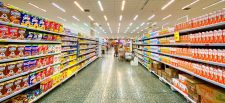Shoppers have made an additional 14 million trips to discounters Aldi and Lidl compared to last year, according to the latest grocery market share figures from Kantar Worldpanel.
Published for the 12 weeks to 4th November 2018, the data shows that Aldi’s sales increased by 15.5% over this period – the fastest rate since January 2018.
This has helped lift its market share by 0.9 percentage points to 7.6%, which is the largest year-on-year share gain by any retailer in nearly four years.
Meanwhile, Lidl is in double digit growth for the second month running; sales are up by 10.2% compared with a year ago and its market share is up 0.4 percentage points to 5.5%.”
Fraser McKevitt, head of retail and consumer insight at Kantar Worldpanel, comments: “Five years ago, just under half of British households were visiting one of the discount retailers at least once in a 12 week period. This now stands at almost two-thirds, which is reflected in their continued growth.”
At a total market level, sales at multiple food retailers increased by 2.6%.
Among the major supermarkets, Co-op was the other big winner this period, with sales up by 5.1%.
The retailer has cornered a further 0.2% of the market, taking its total share to 6.3% and securing a seventh consecutive period of sales growth. The grocer has attracted an extra 213,000 shoppers in the latest period.
A high-profile environmental stance is helping Iceland to thrive among a much wider set of shoppers, as McKevitt explains: “Nearly 37% of Iceland’s sales come from the more affluent ABC1 social group – five years ago this was less than a third.
“Its banned palm oil Christmas advert is tugging at the heartstrings of Britain’s middle classes and could translate into strong sales growth, especially if it manages to pique the interest of the half of the population who haven’t shopped there in the past year.
“Sales are already up by 5.0% this period and while frozen food is still increasing, 94% of this growth actually comes from its fresh, chilled and ambient food aisles.”
Sales at Asda have increased by 2.6% year-on-year meaning the retailer has now been in continual growth since April 2017.
In addition, Morrisons has achieved its 25th consecutive period of growth, with sales up 1.5% in the 12 weeks to 4th November.
At Tesco, sales were up by 0.4%, with market share down by 0.6 percentage points to 27.5%.
Sainsbury’s sales fell by 0.6%, the first decline for the retailer since June. However, its e-commerce channel continues to be a bright spot and is achieving double digit growth as it reaches 7% of Sainsbury’s total shopper base.
Sales fell by 1.0% at Waitrose, marking the first decline for the John Lewis-owned supermarket since February 2009 – shortly before it launched its Waitrose Essentials range.
This brings an end to the longest run of growth for any of the bricks and mortar retailers excluding the discounters.









